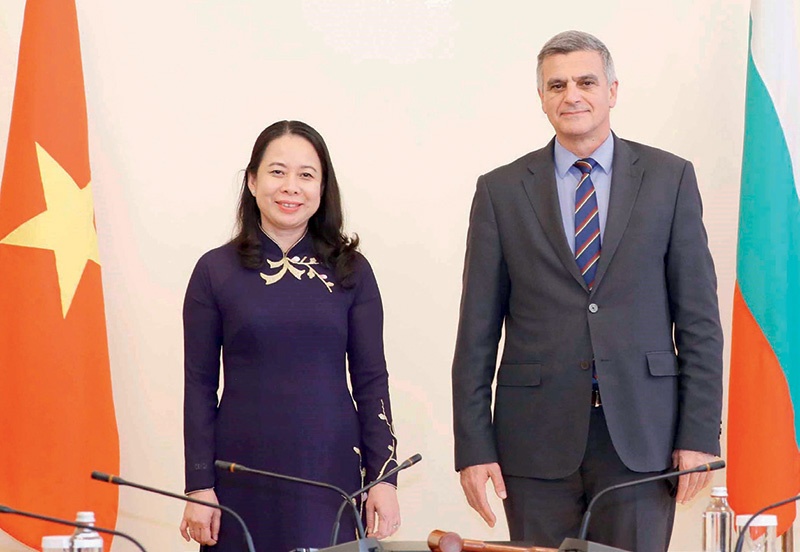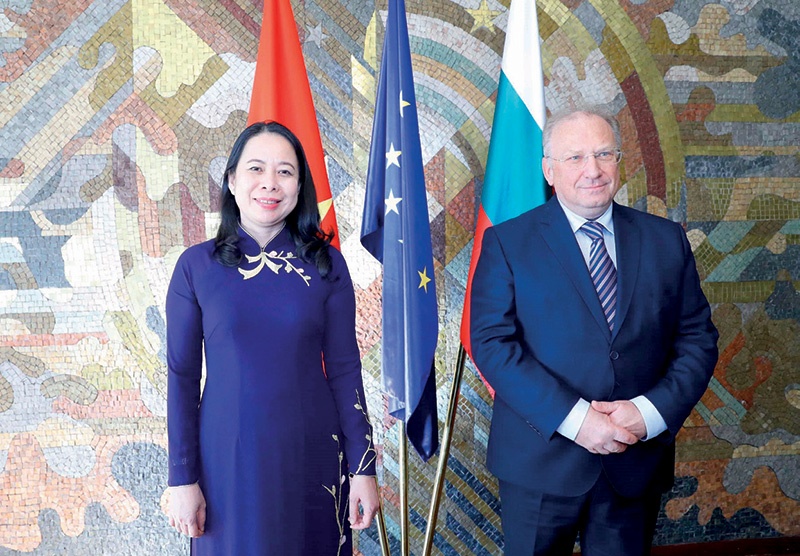Vietnam demonstrating important achievements in gender equality
 |
| Vice President Vo Thi Anh Xuan meets with Bulgaria's caretaker Prime Minister Stefan Yanevh in Sofia on October 26 |
Last week, State Vice President Vo Thi Anh Xuan attended the Global Summit of Women in Lisbon, with the Ministry of Foreign Affairs spokesperson emphasising that Vice President Xuan's attendance demonstrates Vietnam's ambitions in ensuring gender equality.
The visit is just a small part of the efforts made by the whole political system after the decade-long implementation of Vietnam's National Strategy on Gender Equality (NSGE). Since 2011, Vietnam has obtained numerous encouraging results, contributing to narrowing gender gaps in all spheres, thereby making positive contributions to the socioeconomic development process of the country.
Vietnam is also notable for having a dedicated gender equality law, as well as separate legislation on the prevention and control of violence, and express provisions for gender equality in employment – all of which have been in place for over a decade.
In order to reinforce the effectiveness of the NSGE for this decade, on October 23, Deputy Prime Minister Vu Duc Dam signed Decision No.1790/QD-TTg approving the Communication Programme on Gender Equality until 2030, making it Vietnam’s first separate communications programme for this area.
The programme sets a target that by 2025, all ministries, branches, and localities will implement monthly action for gender equality and the prevention and response to gender-based violence every year. It also targets that by 2030, the awareness of gender equality in the community is to increase by 10-15 per cent compared to 2025.
 |
| Vice President Vo Thi Anh Xuan meets with Foreign Minister Svetlan Stoev |
In March, the government enacted Resolution No.28/NQ-CP approving the NSGE for 2021-2030, which combines six objectives and 20 specific targets in an effort to further narrow gender gaps across politics; the economy, labour; family life and gender-based violence prevention; health; education and training; and information and communications.
In addition to several targets whose outcomes obtained from the previous period should be sustained, the NSGE 2021-2030 also includes novel targets such as reducing the proportion of women workers in the agricultural sector; increasing the number of public social assistance establishments that carry out activities to support, prevent, and respond to gender-based violence; reducing adolescent birth rates; introducing health facilities providing pilot healthcare services for LGBT people; and incorporating contents on gender and gender equality in the curricula of the national education system.
Meanwhile, the Country Gender Equality Profile Vietnam 2021, the first comprehensive report on the gender equality situation in Vietnam, was released at a conference on October 26 by UN Women, the Australian Embassy in Vietnam, the Asian Development Bank, and the International Labour Organization. It shows that just over 30 per cent of deputies of the 15th National Assembly and nearly 30 per cent of all-level people’s councils for the 2021-2026 term are women. The global average proportion of women National Assembly deputies for the 2021-2026 term is 25.5 per cent.
Previously, women’s political representation enjoyed some significant advances over the last five years. For the first time a woman was appointed chair of the National Assembly, three Politburo members among 19 were women, and a woman proposed a bill in the National Assembly.
Together with the cause of gender equality, the contingent of female entrepreneurs has been growing stronger. On October 13, Vice President Xuan spoke at the Vietnam Women Entrepreneurs’ Forum themed on digital transformation on the occasion of Vietnam Entrepreneurs' Day. She noted that female entrepreneurs account for 26.5 per cent of businesses nationwide, placing Vietnam 6th among countries with the highest number of businesswomen. In the fight against the current pandemic, they are actively engaged in prevention and control while making contributions to social welfare.
Commenting on the significant contribution to protecting woman’s rights, Deputy Minister of Labour, Invalids and Social Affairs Nguyen Thi Ha said, “The Vietnamese government is making efforts to implement the necessary measures to ensure social security, promote gender equality, and prevent and respond to gender-based violence, particularly violence against women and girls. Under policies to support people and businesses during the pandemic, women and children are always the prioritised targets to receive better support packages. These efforts have been highly appreciated by international organisations.”
What the stars mean:
★ Poor ★ ★ Promising ★★★ Good ★★★★ Very good ★★★★★ Exceptional
Themes: Empowering Women
- Female influence still to be attained
- Shaping Vietnam's corporate future: female board members show business excellence
- Nestlé Vietnam contributes to elevating the role of women across the supply chain
- Empowering female leaders in tech: insights and aspirations shared at KPMG Tech Innovator 2023
- Brighter Path programme hosts empowerment meeting for ethnic minority girls
Related Contents
Latest News
More News
- Dong Ho folk painting added to UNESCO’s urgent safeguarding list (December 11, 2025 | 18:09)
- Conference focuses on switch from dog and cat meat trade to sustainable, safe jobs (December 11, 2025 | 12:13)
- 3F Plus clean pork amazes Michelin-starred chefs (December 09, 2025 | 12:15)
- The Rhythm of Blues – Colours of the Year 2026 (December 06, 2025 | 12:10)
- Pan Pacific Hanoi kicks off 2026 art awards celebrating young and disabled artists (November 06, 2025 | 18:25)
- PREP AI Language Fair 2025 highlights AI-powered language learning (November 03, 2025 | 09:00)
- Hanoi strengthens rabies control and supports transition of dog and cat meat trade (October 28, 2025 | 18:09)
- World-famous Gaia Earth installation touches down at UNIS Hanoi (October 07, 2025 | 13:40)
- Sidecar passion drives Vietnamese motor enthusiasts wild (September 05, 2025 | 09:00)
- Sheraton Saigon unveils artistic mooncake collection for 2025 (August 08, 2025 | 09:00)

 Tag:
Tag:



















 Mobile Version
Mobile Version